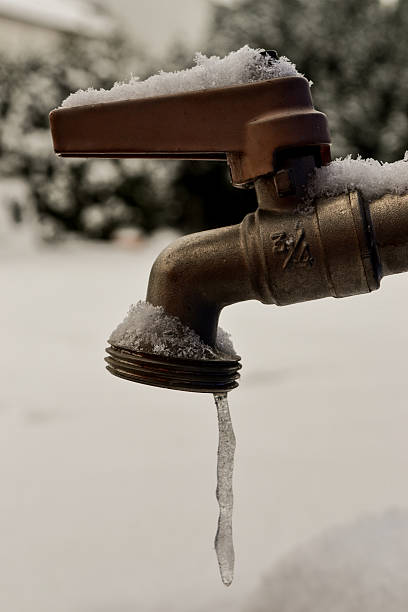How to Prevent Frozen Plumbing in Winter: Professional Guidance
How to Prevent Frozen Plumbing in Winter: Professional Guidance
Blog Article
In this article below you can discover some high-quality ideas relating to Helpful Tips to Prevent Frozen Pipes this Winter.
:strip_icc()/snow-outdoor-faucet-pipes-4af65d1e5e904fb1aa7bf74071fe5d89.jpg)
Winter can wreak havoc on your pipes, especially by freezing pipes. Here's just how to stop it from happening and what to do if it does.
Introduction
As temperatures decrease, the danger of frozen pipes increases, possibly bring about costly repair services and water damage. Understanding how to stop icy pipes is important for homeowners in cold environments.
Comprehending Icy Pipelines
What creates pipes to freeze?
Pipes ice up when revealed to temperature levels below 32 ° F (0 ° C) for extended durations. As water inside the pipelines ices up, it broadens, putting pressure on the pipe wall surfaces and potentially creating them to rupture.
Risks and problems
Icy pipes can result in water supply disruptions, property damages, and pricey repairs. Burst pipes can flood homes and cause extensive structural damage.
Signs of Frozen Pipes
Identifying icy pipelines early can avoid them from bursting.
Just how to determine frozen pipelines
Seek lowered water flow from taps, uncommon smells or sounds from pipes, and noticeable frost on subjected pipelines.
Prevention Tips
Insulating prone pipelines
Cover pipelines in insulation sleeves or utilize heat tape to shield them from freezing temperatures. Focus on pipelines in unheated or outside areas of the home.
Heating strategies
Maintain indoor rooms appropriately heated up, especially areas with plumbing. Open closet doors to allow warm air to circulate around pipelines under sinks.
Securing Outside Plumbing
Garden hoses and outside taps
Disconnect and drain pipes garden tubes before winter season. Install frost-proof faucets or cover exterior taps with insulated caps.
What to Do If Your Pipes Freeze
Immediate activities to take
If you think frozen pipelines, maintain taps open up to soothe stress as the ice melts. Use a hairdryer or towels soaked in warm water to thaw pipes gradually.
Long-Term Solutions
Structural modifications
Take into consideration rerouting pipes away from exterior wall surfaces or unheated locations. Include additional insulation to attics, basements, and crawl spaces.
Updating insulation
Buy high-quality insulation for pipelines, attic rooms, and walls. Proper insulation aids maintain regular temperatures and lowers the danger of frozen pipes.
Final thought
Preventing icy pipes calls for positive measures and fast responses. By recognizing the reasons, indicators, and preventive measures, property owners can protect their plumbing during cold weather.
Helpful Tips to Prevent Frozen Pipes this Winter
UNDERSTANDING THE BASICS: WHY PIPES FREEZE AND WHY IT’S A PROBLEM
Water freezing inside pipes is common during the winter months, but understanding why pipes freeze, and the potential problems it can cause is crucial in preventing such incidents. This section will delve into the basics of why pipes freeze and the associated problems that may arise.
THE SCIENCE BEHIND FROZEN PIPES
When water reaches freezing temperatures, it undergoes a physical transformation and solidifies into ice. This expansion of water as it freezes is the primary reason pipes can burst. As the water inside the pipe freezes, it expands, creating immense pressure on the walls. If the pressure becomes too great, the pipe can crack or rupture, leading to leaks and water damage.
FACTORS THAT CONTRIBUTE TO PIPE FREEZING
Low Temperatures: Extremely cold weather, especially below freezing, increases the risk of pipes freezing. Uninsulated or Poorly Insulated Pipes: Pipes located in unheated areas, such as basements, crawl spaces, or attics, are more prone to freezing. Insufficient insulation or lack of insulation altogether exacerbates the problem. Exterior Wall Exposure: Pipes running along exterior walls are susceptible to freezing as they encounter colder temperatures outside. Lack of Heating or Temperature Regulation: Inadequate heating or inconsistent temperature control in your home can contribute to frozen pipes. PROBLEMS CAUSED BY FROZEN PIPES
- Pipe Bursting: As mentioned earlier, the expansion of water as it freezes can cause pipes to burst, resulting in significant water damage.
- Water Damage: When pipes burst, it can lead to flooding and water damage to your property, including walls, ceilings, flooring, and personal belongings.
- Structural Damage: Prolonged exposure to water from burst pipes can compromise the structural integrity of your home, leading to costly repairs.
- Mold and Mildew Growth: Excess moisture from water damage can create a favorable environment for mold and mildew growth, posing health risks to occupants.
- Disrupted Water Supply: Frozen pipes can also result in a complete or partial loss of water supply until the issue is resolved.
WHY CERTAIN PIPES ARE MORE PRONE TO FREEZING
- Location: Pipes located in unheated or poorly insulated areas, such as basements, crawl spaces, attics, or exterior walls, are at higher risk of freezing.
- Exterior Pipes: Outdoor pipes, such as those used for irrigation or exposed plumbing, are particularly vulnerable to freezing as they are directly exposed to the elements.
- Supply Lines: Pipes that carry water from the main water supply into your home, including the main water line, are critical to protect as freezing in these lines can affect your entire plumbing system.
- Underground Pipes: Pipes buried underground, such as those connected to sprinkler systems or outdoor faucets, can be susceptible to freezing if not properly insulated.
https://busybusy.com/blog/helpful-tips-to-prevent-frozen-pipes-this-winter/

As a serious person who reads on How To Avoid Freezing Pipes, I figured sharing that segment was beneficial. For those who enjoyed our page kindly remember to pass it around. Thanks a lot for your time invested reading it.
Book Appointment Report this page